Moral Particularism
Expanded and revised version of a lecture given at
the Summer School “Moral Reasoning and Ethical Theorising”
(organized by the Netherlands School for Research in Practical Philosophy)
in Soesterberg, The Netherlands, August 20–24, 2005
Moral Principles and Moral Theories
Moral Particularism Defined
Alleged Reasons for the Necessity of Moral Principles in Moral Reasoning
Supervenience and Moral Principles
Universalizability and Moral Principles
Generality of Reasons and Atomism vs. Holism in the Theory of Reasons
Strong and Weak Versions of Particularism and Generalism
Appendix: Particularism and Universalizability
References
Moral Principles and Moral Theories
The dominant view in ethics has always been that moral reasoning is essentially tied to moral rules and principles. Some of the functions moral rules and principles are supposed to fulfil are the following:
- They provide criteria of right and wrong actions that can be applied to any case and allow us to derive particular moral judgements that tell us what we ought to do in any given situation.
- They systematize our particular moral judgements and unify morality.
- They justify and explain our particular moral judgements.
- They impose consistency and regularity in our moral reasoning and ensure that our moral decisions are not arbitrary.
- They function as public standards of moral evaluation and decision-making that make our behaviour more predictable and facilitate cooperation.
“[T]hey structure an agent’s perception of his situation so that what he perceives is a world with moral features. They enable him to pick out those elements of his circumstances or of his proposed actions which require moral attention.” (“Rules of moral salience”) (Herman 1985, 77)
- They are necessary in moral upbringing and education.
Moral principles are an essential part of moral theories, and it is the task of moral theories to formulate a few general principles which can be applied to every morally relevant situation.
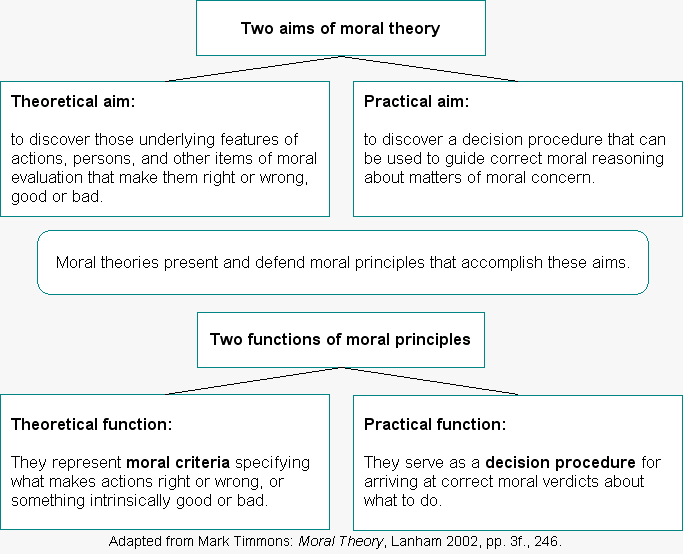
Figure 1: Moral Theories and moral principles
Moral Particularism Defined
Moral particularists reject this view of the role of principles in moral reasoning, which means that they reject some or all of the above-mentioned functions of moral principles and defend instead some or all of the following claims:
- There are no or at most very few (true or defensible) moral principles.
- Moral principles are not necessary for moral reasoning.
- Moral principles are not even useful in moral reasoning, but rather
- can be positively harmful in moral reasoning.
The leading proponent of particularism is Jonathan Dancy. He described his “leading aim” as “to decide whether moral rationality depends in any way on the existence and application of true general principles.” (Dancy 1999, 25) According to generalism it does so depend on principles, according to particularism it does not depend on principles:
Generalism: the very possibility of moral thought and judgement depends on the provision of a suitable supply of moral principles.
Particularism: the possibility of moral thought and judgement does not depend on the provision of a suitable supply of moral principles. (Dancy 2004, 7)
These are Dancy’s official definitions of particularism and generalism in his recent book Ethics Without Principles.
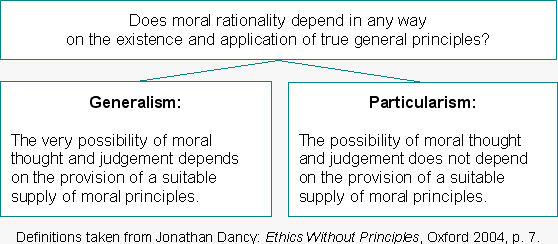
Figure 2: Dancy’s definitions of generalism and particularism
That moral rationality or the very possibility of moral thought and judgement does depend on moral principles is a very strong claim. Belief in the existence of true moral principles alone does not commit to this strong claim. Even the belief that moral principles fulfil all of the above-mentioned functions does not commit to this claim. Hence, there are many advocates of moral rules and principles who would not count themselves as generalists in Dancy’s strong sense. Does anybody hold this strong form of generalism? Is it worth the trouble to refute this strong generalism?
Alleged Reasons for the Necessity of Moral Principles in Moral Reasoning
It seems to be a pervasive and deeply entrenched thought that moral reasoning necessarily involves moral principles. The underlying idea is that
- justifying a particular moral judgement means giving reasons for that judgement and reasons are inherently general: “If something is a reason in this case it cannot just be a reason in this case; it must be a reason elsewhere” (McNaughton 1988, 191) (“Universality /generality of reasons”),
- therefore, particular moral judgements can be justified only by showing that they are derivable from general moral principles,
- therefore, making a (justifiable) particular moral judgement commits one to accepting a moral principle.
Usually this idea is itself justified by appeal to either or both of two basic principles which are taken to be indispensable in moral reasoning: the principle of universalizability and the supervenience thesis. It is often assumed that both these principles imply the existence of moral principles.
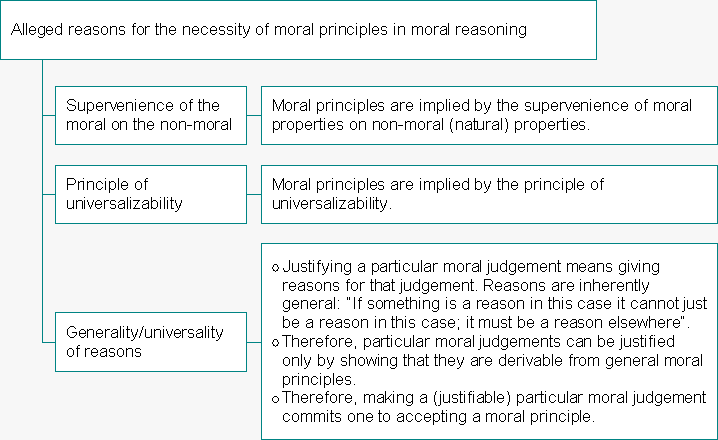
Figure 3: Alleged reasons for the necessity of moral principles in moral reasoning
Supervenience and Moral Principles
It is almost universally accepted that moral properties supervene on natural properties.
(For ease of exposition I do not distinguish between strong and weak supervenience in what follows.)
Moral properties supervene on natural properties if and only if
- any two objects with the same natural properties have the same moral properties, i. e.
- any two objects with different moral properties have different natural properties.
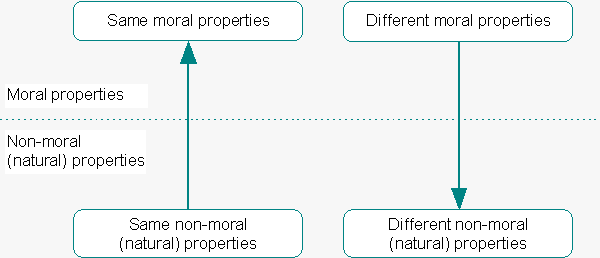
Figure 4: Supervenience of moral properties
The Supervenience thesis does indeed entail principles:
The particular moral judgement “Action a is right” implies in virtue of the supervenience thesis the principle
- “Every action similar to a in all its natural properties is right”, i. e.
- “Every action with exactly the same natural properties as action a is right”, i. e.
- “Every action with the natural properties p1, p2, ..., pn (and no other natural properties) is right“ (whereby p1, p2, ..., pn are all the natural properties of action a).
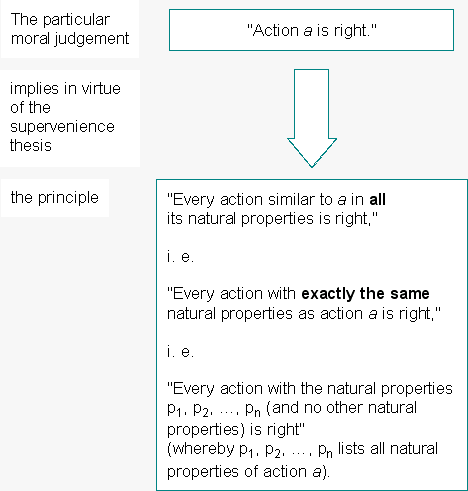
Figure 5: Supervenience and principles
But although the supervenience thesis (applied to particular moral judgements) does imply principles, these principles are not the kind of principles which particularists reject and generalists defend:
The principle entailed by the supervenience thesis is uninformative and useless because:
- There are no two actions with exactly the same natural properties. The principle has therfore only one instance and cannot be applied to other actions.
- The principle simply enumerates all natural properties of the action. It does not distinguish between relevant and irrelevant properties and pick out only the relevant ones.
- It does not tell us why, i. e. in virtue of which properties, the action is wrong.
- And besides: No one can formulate the principle (because no one can enumerate all the properties of an action).
The principle generated by the supervenience thesis is a principle only in the formal sense of being governed by a general quantifier. It is no genuine moral principle if we understand by a moral prinicple a principle that picks out morally relevant properties and is applicable to more than one case. Hence, the supervenience thesis cannot support the claim that making a particular moral judgement commits to accepting a moral principle. There is therefore no conflict between supervenience and particularism and particularists can readily accept the supervenience thesis.
Universalizability and Moral Principles
The second fundamental principle of moral reasoning that is supposed to generate moral principles is the principle of universalizability. The relationship between particularism and universalizability is a bit more complicated because many philosophers believe that they are indeed opposed to each other. Dancy began his arguments against generalism with an attack on universalizability and wrote that “the rejection of universalizability is part and parcel of the rejection of generalism in the theory of reasons.” (Dancy 1993, 57) Roger Crisp, too, believes that universalizability and particularism are incompatible, but takes this to be an argument against particularism:
Particularism about reasons implies the falsity of the universalizability thesis. Since [...] that thesis seems plausible, we have here a further argument against particularism.” (Crisp 2000, 42).
I agree with Crisp that if particularism and universalizability were incompatible, that would be a strong argument against particularism, rather than an argument against universalizability. However, simply appealing to the principle of universalizability seems to be a too easy way to dismiss particularism. And in fact, as we will see, particularism and universalizability are perfectly compatible.
The principle of universalizability may be formulated as:
(U) If an action a is right,
then any action similar to a in all morally relevant respects is also right.
According to this principle anyone who makes the singular moral judgement “Action a is morally right”, must also accept the principle “Every action similar to a in all morally relevant respects is morally right”. Thus, universalizability seems indeed to imply principles:
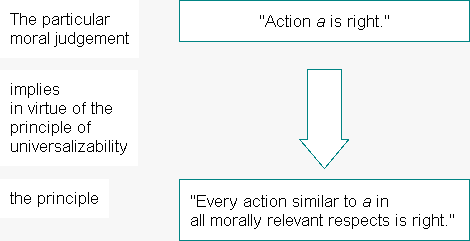
Figure 6: Universalizability and principles I
But, note how different the principle implied by the universalizability thesis is compared to those familiar moral principles we accept in daily life or come across in ethical theories.
Compare
Every action similar to a in all morally relevant respects is right.
Every action that is similar in all morally relevant respects to this killing of an innocent person is wrong.
to
Telling the truth is right. (Every act of truth-telling is right.)
Keeping your promises is right. (Every act of keeping a promise is right.)
Killing innocent persons is wrong. (Every killing of an innocent person is wrong.)
Moral principles like the three just mentioned are not implied by the universalizability thesis (together with a singular moral judgement). If someone judges an action to be wrong because it is the killing of an innocent person, all that she is committed to by the universalizability thesis is that she has to judge as wrong every action similar in all morally relevant respects. This, however, does not imply, that she has to judge every killing of an innocent person as wrong, and there is no way to derive this (or any other) moral principle from applying the universalizability thesis to the particular moral judgment.
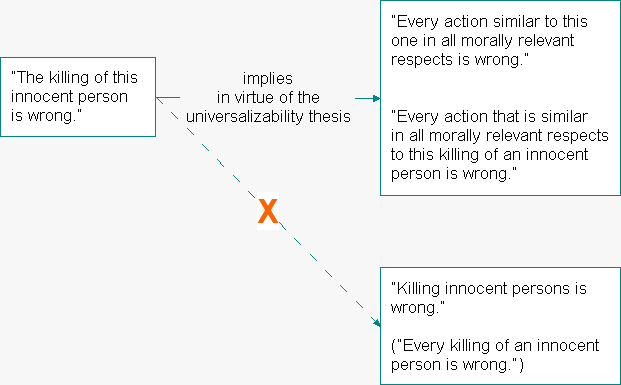
Figure 7: Universalizability and principles II
The principles that in virtue of the universalizability thesis follow from singular moral judgements are not very helpful: They provide no criterion for morally relevant similarity and leave it entirely open when two actions are to count as similar in all morally relevant respects. Another action could be, like the first one, the killing of an innocent person, but still differ in morally relevant respects from the first because, say, the killing was necessary to save many lives. Whether or not this is a morally relevant difference is left open by the principle “Every action similar in all morally relevant respects to this killing of an innocent person is wrong”. The principle is therefore no help at all in deciding whether an action is right or wrong.
As regards universalizability we can now draw the following conclusions:
- Universalizability does not imply any substantial moral principles (like “Killing innocent persons is wrong”). Consequently, it does not imply the kind of principles particularists reject and generalists to defend.
- Universalizability has therefore no bearing on the debate between generalists and particularists: Since it does not establish the existence of moral principles it can readily be accepted by particularists and cannot be used as an argument for generalism and against particularism.
- Universalizability does not imply that moral reasoning requires the existence (or acceptance) of moral principles.
One might wonder why so many philosophers have thought that the principle of universalizability implies moral principles and is incompatible with particularism. In the appendix I try to answer this question.
Since neither supervenience nor universalizability – which are the most basic principles in the logic of moral reasoning – imply the existence of moral principles, we can conclude that the logic of moral reasoning does not require the existence (or acceptance) of moral principles. There is thus no reason to adopt generalism in the (strong) sense defined above. And if particularism is only the denial of generalism it should hardly be contentious.
Generality of Reasons and Atomism vs. Holism in the Theory of Reasons
There is a further thought in support of the necessity of moral principles, known under the heading “generality of reasons” or “universality of reasons”. Often, this thought is only an application of (or another name for) the principle of universalizability and provides no additional reason for generalism. But there is a different understanding of the generality of reasons which, if true, would indeed imply moral principles. Dancy calls this sense of the generality of reasons the invariance of reasons:
Generality of reasons:
All reasons are invariant reasons: “if a feature is a reason in one case, it is the same reason in any other case.” (Dancy 2004, 74)
The generality of reasons follows from the atomism in the theory of reasons:
Atomism in the theory of reasons:
A feature that is a reason in one case must remain a reason, and retain the same polarity, in any other. (Dancy 2004, 7)
Atomism does indeed commit us to accepting moral principles: If one gives as a reason against an action that it would be a lie, and if this reason is an invariant reason, then involving a lie always counts against an action and one must accept the moral principle that lying always (i. e. in any context) counts against an action.
Hence, if atomism were true we would finally have found a reason for the necessity of moral principles in moral reasoning. Consequently, atomism in the theory of reasons is now Dancy’s main target: Only if he can refute atomism can he reject generalism with its insistence on the necessity of moral principles, and defend particularism. Dancy argues against atomism mainly by giving examples which are supposed to show falsity of atomism:
Example against atomism in the theory of theoretical reasons:
[S]uppose that it currently seems to me that something before me is red. Normally, one might say, that is a reason (some reason, that is, not necessarily sufficient reason) for me to believe that there is something red before me. But in a case where I also believe that I have recently taken a drug that makes blue things look red and red things look blue, the appearance of a red-looking thing before me is a reason for me to believe that there is a blue, not a red thing before me. (Dancy 2004, 74)
Example against atomism in the theory of practical reasons:
[T]hat there will be nobody much else around is sometimes a good reason for going there, and sometimes a very good reason for staying away. That one of the candidates wants the job very much indeed is sometimes a reason for giving it to her and sometimes a reason for doing the opposite. (Dancy 2004, 74)
Because of examples like these we should, according to Dancy, reject atomism in favour of holism:
Holism in the theory of reasons:
A feature that is a reason in one case may be no reason at all, or an opposite reason, in another. (Dancy 2004, 7)
Holism does not commit us to accepting moral principles: If holism is true and one gives as a reason against an action that it would be a lie one is not committed to believing that this reason is the same reason in any other case. Hence, one is not committed to the moral principle that lying always (i. e. in any context) counts against an action. Holism, therefore blocks the argument for the necessity of moral principles and thus entails particularism: If holism in the theory of reasons is true, the possibility of moral reasoning does not depend on moral principles. The plausibility of particularism thus depends entirely on the plausibility of holism.
It should be noted that Dancy admits that holism is consistent with the existence of invariant reasons and moral principles. Holism rejects the necessity of moral principles not the possibility of moral principles. By admitting the possibility of moral principles Dancy rejects all attempts to refute particularism by giving examples of invariant reasons and moral principles.
Strong and Weak Versions of Particularism and Generalism
As the last paragraph suggests one might distinguish between two versions of particularism:
Strong particularism: There are no defensible moral principles
Moral Particularism, at its most trenchant, is the claim that there are no defensible moral principles, that moral thought does not consist in the application of moral principles to cases, and that the morally perfect person should not be conceived as the person of principle. (Dancy 2001)
Weak particularism: The rationality of moral thought does not depend on moral principles
The strongest defensible version, perhaps, holds that though there may be some moral principles, still the rationality of moral thought and judgement in no way depends on a suitable provision of such things; and the perfectly moral judge would need far more than a grasp on an appropriate range of principles and the ability to apply them. Moral principles are at best crutches that a morally sensitive person would not require, and indeed the use of such crutches might even lead us into moral error. (Dancy 2001)
Correspondingly, one should distinguish between strong and weak generalism:
Weak generalism: There are defensible moral principles.
Strong generalism: The rationality of moral thought does depend on moral principles.
In his earlier works Dancy was more inclined to strong particularism whereas in his recent book he defends only weak particularism. But what is the significance of weak particularism? Probably most generalists are (or, at least, could be) weak generalists and could accept weak particularism. (I cannot discuss these questions further. Dancy believes that his arguments for weak particularism make it implausible to suppose that there are any defensible substantial moral principles.)
Appendix: Particularism and Universalizability
As mentioned above, particularism has often been regarded as incompatible with the principle of universalizability. The principle of universalizability claims:
(U) If an action a is right,
then any action similar to a in all morally relevant respects is also right.
It[1] is obvious that (U) is analytic and cannot possibly be denied: Two actions similar in morally relevant respects are eo ipso morally similar. Were they not morally similar, there would be a morally relevant difference between them and they would not be similar in morally relevant respects. It would be self-contradictory to admit that two actions are similar in morally relevant respects and then to judge one to be right and the other to be wrong.
Since (U) is analytic, particularism would not warrant serious attention if particularists were committed to denying (U). But why should particularists want to deny it? Which particularist doctrine is supposed to contradict it? The essential point of particularism is the rejection of moral principles along with the rejection of the claim that properties which are morally relevant in one case are likewise morally relevant in other cases. Only if (U) is thought to be at odds with these claims do particularists have reason to reject it. The idea that (U) implies moral principles is common and is held, in particular, by R. M. Hare, who is the main target of Jonathan Dancy’s criticisms of universalizability. Yet, in spite of its general acceptance, this idea is wrong. As was argued above, (U) does not imply moral principles. If someone judges an action to be wrong because it is a lie, all that she is committed to by (U) is that she has to judge as wrong every action similar in all morally relevant respects. This, however, does not imply, that she has to judge every lie as wrong, and there is no way to derive this (or any other) moral principle from applying (U) to the particular moral judgment. (U) implies nothing as to which actions are similar in all morally relevant respects and the point of (U) is not to apply a judgment made about one action to other actions or, as Dancy puts it, ‘to drive us in what may seem a very simple-minded way from one case [...] to another which happens to resemble the first in some limited way’ (Dancy 1993: 82). (U) is too trivial to accomplish this. Its point is that someone who passes different moral judgments on two actions which appear to be similar in morally relevant respects must be able to pinpoint a morally relevant difference between them or else revise one of her judgments. Dancy himself does rely on this pattern of argument as the following quotation shows:
The coherence of an overall outlook can be questioned in the following way without generalist motivation. ‘Here you think the fact that she was unhappy functions as a reason in one way, and there you took it to function in quite another. To me they seem to be functioning in much the same way both times, so that I can’t really see how you can distinguish in the way you do. What is the relevant difference between the two cases?’ This challenge can always be made within the constraints of particularism, and there must be an answer to it if one’s position across the two cases is to emerge as coherent. (Dancy 1993: 63f.)
In this reasoning we see a clear application of (U). Since even particularists must presuppose (U), the alleged conflict between universalizability and particularism must lie somewhere else.
The conflict arises only if the universalizability thesis (U) is confused with the following thesis:
(P) If some action a1 is right,
then any action which has all the properties in virtue of which a1 is right, is also right.
(P) implies the existence of moral principles, and there would indeed be a conflict between universalizability and particularism if (P) were an adequate interpretation of the universalizability thesis. Many philosophers fail to distinguish between (U) and (P). They start talking about (U) and then interpret (U) as (P). As a consequence their talk about universalizability reflects an ambiguity between (U) and (P) and it is this ambiguity which accounts for the alleged conflict between particularism and universalizability. Some claims made about ‘the universalizability thesis’ are true only of either (U) or (P) but not of both. In particular, the claim that the universalizability thesis is analytic and a necessary feature of moral language is true only if applied to (U) but wrong if applied to (P). The claim that the universalizability thesis implies a commitment to moral principles is true only if applied to (P) and wrong if applied to (U).
The confusion between (U) and (P) can be traced back to Hare’s introduction of the universalizability thesis in his Freedom and Reason. There he writes:
If a person says that a thing is red, he is committed to the view that anything which was like it in the relevant respects would likewise be red. The relevant respects are those which, he thought, entitled him to call the first thing red; in this particular case, they amount to one respect only: its red colour. [...] ‘This is red’ entails ‘Everything like this in the relevant respects is red’ simply because to say that something is red while denying that some other thing which resembles it in the relevant respects is red is to misuse the word ‘red’; [...].
[...] And so if a person who says ‘This is red’ is committed also to the proposition ‘Everything like this in the relevant respects is red’, then he is, further, committed to the proposition that there is a property such that this has it and such that everything which has it is red. And the second part of this proposition contains no singular terms, and can therefore be called properly universal. (Hare 1963, 11)
Universalizability in this sense is, according to Hare (1963, 15ff., 39), a feature not only of descriptive judgments but of all judgments with descriptive meaning. Because moral judgments too have descriptive meaning they are universalizable in the same sense as descriptive judgments. The quoted passages, therefore, hold equally if we replace the descriptive judgment “This is red” with the moral judgment “This action is right”. Applied to moral judgments, then, Hare is moving here from (U) to (P). But his reasoning is fallacious. Hare first assumes that if an action a1 is right, then any action similar in morally relevant respects is also right. Then he claims that the morally relevant respects are those properties of a1 in virtue of which it is (judged to be) right. Therefore, any action with those properties in virtue of which a1 is right, is also right – which is just what (P) says. As it stands, however, this argument is incomplete and contains as a suppressed premise the following thesis:
(R) Two actions a1 and a2 are similar in all morally relevant respects
if a2 shares with a1 all the properties which are the reasons why a1 is right.
Dancy has effectively shown that (R) is untenable. Besides the properties in virtue of which a1 is right, a2 may have some additional morally relevant properties which may result in a2 not being similar in all morally relevant respects to a1. From the fact that a2 shares with a1 all the properties in virtue of which a1 is right, one cannot infer that a2 does not have any further morally relevant properties which make it wrong. Therefore, one cannot infer that a1 and a2 are similar in all morally relevant respects. Consequently, (R) is wrong.
How could anyone have thought otherwise? Perhaps the reason for holding (R) to be true was this: First, one holds that if a2 has those properties in virtue of which a1 is right, then a2 and a1 have the same morally relevant properties. Then it is assumed that if two actions have the same morally relevant properties, they are similar in all morally relevant respects. These assumptions naturally lead to (R) if an ambiguity in talking about two actions having the same morally relevant properties is neglected. That two actions have the same morally relevant properties could mean either that those properties which are morally relevant for a1 (i. e. in virtue of which a1 is right) do occur in a2 as well, or that a2 shares with a1 the properties in virtue of which a1 is right and does not have any further morally relevant properties (which do not occur in a1). That two actions have the same morally relevant properties according to the first interpretation does not exclude the possibility that a2 has some further morally relevant properties which do not occur in a1. Therefore, one cannot infer that a1 and a2 are similar in all morally relevant respects and have the same moral property. If two actions have the same morally relevant properties according to the second interpretation, they are similar in all morally relevant respects and have, therefore, the same moral property. But based simply on the fact that a2 has those properties in virtue of which a1 is right, one cannot infer that a1 and a2 have the same moral properties as interpreted in this second sense. That is, one cannot infer that a1 and a2 are similar in all morally relevant respects.
Another way to see the fallacy in Hare’s reasoning is this: Hare claims that the expression ‘like this’ can be substituted by a term which describes the respects in which two actions are alike. This claim, however, holds only in one case: If two actions are both judged to be right, then – in retrospect – one can find (or invent) a term to describe the respects in which the two actions are alike and in virtue of which they are both right. Yet, from this it does not follow that it is possible to judge one action to be right and then to find a term to describe the respects in virtue of which this action is right, such that it further holds: every other action which has the properties to which this term refers is right too. Neglecting this results in neglecting the difference between (U) and (P).
Hare’s fallacy is repeated by Dancy:
Hare holds that moral judgements are universalizable in this sense: a person who makes a moral judgement is committed to making the same judgement of any relevantly similar situation. A situation is relevantly similar to the first if it shares with the first all the properties that were the person’s reasons for his original judgement. So if we come across a case which resembles the first one in those limited respects, we are compelled to make the same judgement or to retract our first judgement. In this sense each judgement creates a moral principle. Where our reasons for approval were features F1-Fn, our judgement establishes for us the principle ‘All actions that have F1-Fn are right’. (Dancy 1993, 80)
Here Dancy is moving from (U) via (R) to (P). In a recent article he holds that (U) and (R) together make up the universalizabilty thesis:
The principle [of universalizability] is in two parts:
i. If we judge one action right, we must judge any other relevantly similar action right.
ii. An action is said to be relevantly similar if, roughly, it shares with the first action all the properties which were reasons why the first action was right. (Dancy 1999: 28)[2]
Dancy’s (i) and (ii) correspond to my (U) and (R). (U) and (R) together entail (P). The view that the universalizability thesis consists of these two parts was, to my knowledge, first explicitly stated by Sinnott-Armstrong (1999, 5) in paraphrasing the passage from Dancy (1993) quoted above. Traditionally the universalizability thesis referred only to (U) and almost all philosophers who talk about universalizability formulate principles similar to (U). What is more, all the known arguments to the effect that the universalizability thesis is analytic and a necessary feature of moral language have been advanced with regard to (U) only. (U) and (R) are two distinct theses, each of which requires its own justification. (R) is no explication of (U) and cannot be inferred from it. Yet, many philosophers moved from (U) to (R) and (P) by way of the fallacious reasoning exposed above and then put forward claims about (P) which they have, in fact, established only with regard to (U). As a consequence of neglecting the difference between (U) and (P) and the resulting ambiguity in the use of the term ‘universalizability thesis’, it often happens that defenders and opponents of universalizability talk about different things. The debate about particularism and universalizability is fruitless as long as some of the debaters conceive of the universalizability thesis as (U) and others conceive of it as (P) (or, which is the same, as composed of (U) and (R)). Whereas Dancy’s attack on universalizability is directed only at (R) and (P), supporters of universalizability respond by defending (U).
The following table contrasts three related principles which often are not properly distinguished: the principle of universalizability (U), the supervenience thesis (S) and the false principle (P):
Universalizability (U) If an action a1 is right, then any action similar in all morally relevant respects is also right. |
Supervenience (S) If an action a1 is right, then any action similar in all non-moral (natural) properties is also right.i.e. If an action a1 is right, then any action with exactly the same non-moral (natural) properties as a1 is also right. |
(P) If an action a1 is right, then any action which has all the properties in virtue of which a1 is right, is also right. |
| (U) is analytically true and a necessary condition for moral reasoning: Without (U) moral reasoning would be impossible. | Although (S) is not analytically true it is nevertheless a necessary condition for moral reasoning: Without (S) moral reasoning would be impossible. | (P) is false. Philosophers often mistake (P) for (U) or (S), or wrongly believe that (P) is entailed by (U) or (S). |
| (U) is compatible with particularism. | (S) is compatible with particularism. | (P) is not compatible with particularism. |
| (U) provides no criterion for morally relevant similarity and leaves entirely open when two actions are to count as similar in all morally relevant respects. | ||
| (U) applied to the particular judgement “Action a is right” implies the following principle: | (S) applied to the particular judgement “Action a is right” implies the following principle: | (P) applied to the particular judgement “Action a is right” and the judgement “Action a is right in virtue of properties E1, E2 und E3“ implies the following principle: |
| “Every action similar to a in all morally relevant respects is right.” | “Every action with properties E1 ... En is right” (whereby E1 ... En lists all the non-moral properties of a). | “Every action with properties E1, E2 and E3 is right“. |
| This principle contains the singular term “a” and is therefore no universal principle in Hare’s sense. Hence it does not meet Hare’s requirement that moral principles must be universal principles. | This principle refers to all non-moral properties of an action and does not distinguish between morally relevant and morally irrelevant properties. | Unlike (S) this principle refers only to some properties of an action, namely those properties in virtue of which an action is right. |
| This principle cannot function as a decision criterion in other situations: Since this principle cannot tell us whether an action b is similar to a in all morally relevant respects, it cannot tell us whether b is right. | This principle cannot function as a decision criterion in other situations since there exist no two actions which are identical in their non-moral (natural) properties. | This principle can function as a decision criterion and is therefore a genuine moral principle. With its help one can decide which actions are right. |
| It is the aim of moral theories to justify substantive moral principles like (P). Whether there are true moral principles like (P) is an open question which particularists answer negatively and generalists answer positively. But neither (U) nor (S) entails the existence of principles like (P). |
References
Dancy, Jonathan (1981): On Moral Properties, Mind 90, 367–85.
Dancy, Jonathan (1983): Ethical Particularism and Morally Relevant Properties, Mind 92, 530–47.
Dancy, Jonathan (1993): Moral Reasons, Oxford.
Dancy, Jonathan (1999): Defending Particularism, Metaphilosophy 30, 25–32.
Dancy, Jonathan (2000): The Particularist’s Progress, in Moral Particularism, ed. Brad Hooker and Margaret Little, Oxford, 130–56.
Dancy, Jonathan (2001): Moral Particularism, in Stanford Encyclopedia of Philosophy, ed. Edward Zalta, http://plato.stanford.edu/entries/moral-particularism/.
Dancy, Jonathan (2004): Ethics Without Principles, Oxford.
Hare, R. M. (1963): Freedom and Reason, Oxford.
Herman, Barbara (1985): The Practice of Moral Judgment, in Herman, The Practice of Moral Judgment, Cambridge, Mass. 1993, 73–93.
McNaughton, David (1988): Moral Vision. An Introduction to Ethics, Oxford.
Schroth, Jörg (2003): Particularism and Universalizability, Journal of Value Inquiry 37, S. 455–61.
Sinnott-Armstrong, Walter (1999): Some Varieties of Particularism, Metaphilosophy 30, S. 1–12.
Timmons, Mark (2002): Moral Theory. An Introduction, Lanham.
[1] The following paragraphs are taken (with minor revisions) from Schroth (2003).
[2] He adds that “I took my (ii) more or less directly from Hare (1963: 11); [...].” The reference is to the passage I quoted above.